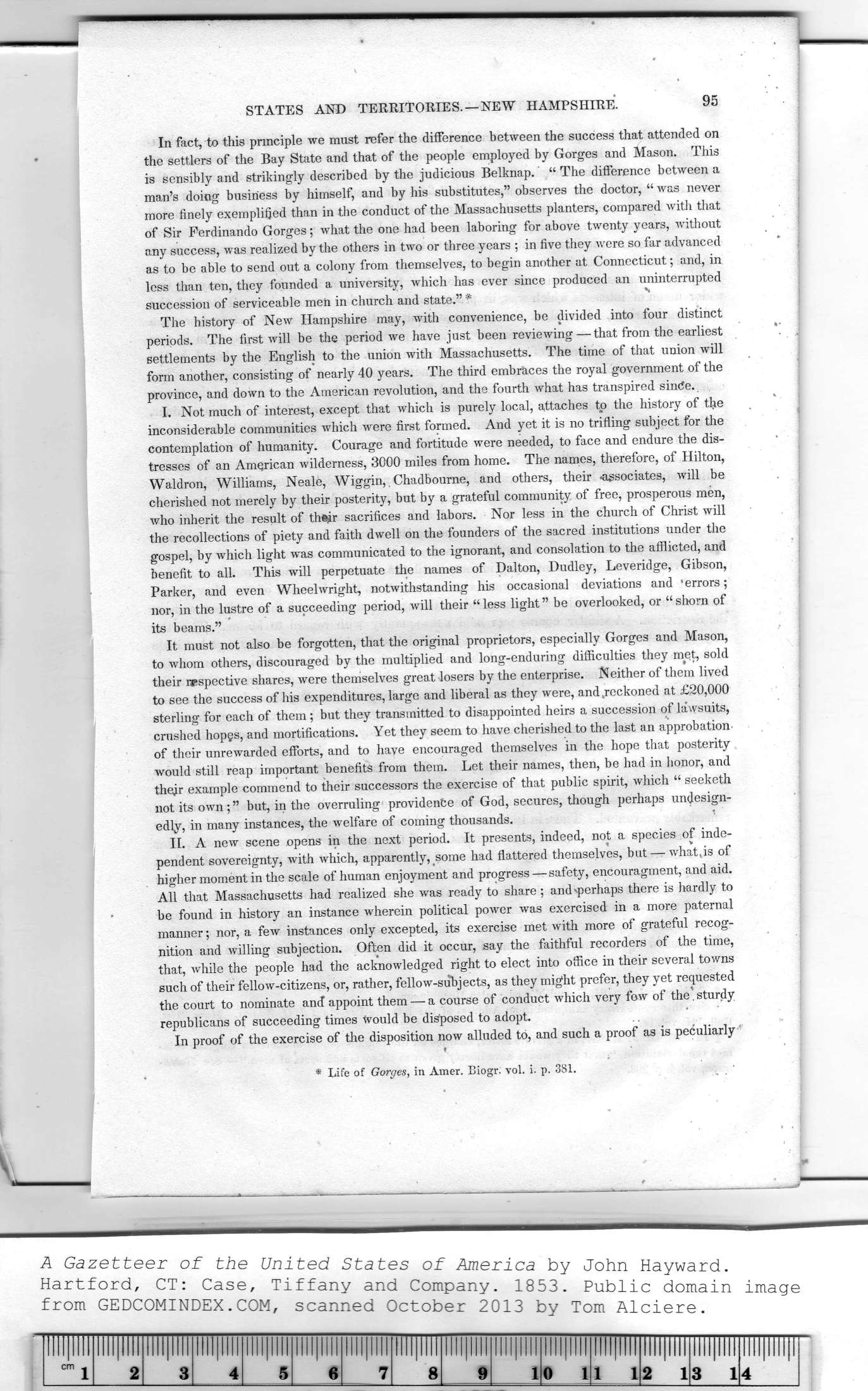|
|
Note: Ctrl and + increases the font size of the text below, Ctrl and - decreases it, and Ctrl and 0 resets it to default size.
STATES AND TERRITORIES. — NEW HAMPSHIRE. 95
In fact, to this principle we must refer the difference between the success that attended on
the settlers of the Bay State and that of the people employed by Gorges and Mason. This
is sensibly and strikingly described by the judicious Belknap. “ The difference between a
man's doing business by himself, and by his substitutes," observes the doctor, “ was never
more finely exemplified than in the conduct of the Massachusetts planters, compared with that
of Sir Ferdinando Gorges; what the one had been laboring for above twenty years, without
any success, was realized by the others in two or three years ; in five they were so far advanced
as to be able to send out a colony from themselves, to begin another at Connecticut; and, in
less than ten, they founded a university, which has ever since produced an uninterrupted
succession of serviceable men in church and state." *
The history of New Hampshire may, with convenience, be divided into four distinct
periods. The first will be the period we have just been reviewing — that from the earliest
settlements by the English to the union with Massachusetts. The time of that union will
form another, consisting of nearly 40 years. The third embraces the royal government of the
province, and down to the American revolution, and the fourth what has transpired sinCe.
I. Not much of interest, except that which is purely local, attaches to the history of the
inconsiderable communities which were first formed. And yet it is no trifling subject for the
contemplation of humanity. Courage and fortitude were needed, to face and endure the dis-
tresses of an American wilderness, 3000 miles from home. The names, therefore, of Hilton,
Waldron, Williams, Neale, Wiggin,. Chadbourne, and others, their -associates, will be
cherished not merely by their posterity, but by a grateful community of free, prosperous men,
who inherit the result of their sacrifices and labors. Nor less in the church of Christ will
the recollections of piety and faith dwell on the founders of the sacred institutions under the
gospel, by which light w'as communicated to the ignorant, and consolation to the afflicted, and
benefit to all. This will perpetuate the names of Dalton, Dudley, Leveridge, Gibson,
Parker, and even Wheelwright, notwithstanding his occasional deviations and 'errors;
nor, in the lustre of a succeeding period, will their “less light" be overlooked, or “shorn of
its beams."
It must not also be forgotten, that the original proprietors, especially Gorges and Mason,
to whom others, discouraged by the multiplied and long-enduring difficulties they met, sold
their respective shares, were themselves great losers by the enterprise. Neither of them lived
to see the success of his expenditures, large and liberal as they were, and .reckoned at £20,000
sterling for each of them ; but they transmitted to disappointed heirs a succession of lawsuits,
crushed hopgs, and mortifications. Yet they seem to have cherished to the last an approbation,
of their unrewarded efforts, and to have encouraged themselves in the hope that posterity
would still reap important benefits from them. Let their names, then, be had in honor, and
thejr example commend to their successors the exercise of that public spirit, which “ seeketh
not its own ; " but, in the overruling providence of God, secures, though perhaps undesign-
edly, in many instances, the welfare of coming thousands. '
II. A new scene opens in the next period. It presents, indeed, not a species of inde-
pendent sovereignty, with which, apparently, some had flattered themselves, but —what,is of
higher moment in the scale of human enjoyment and progress —safety, encouragment, and aid.
All that Massachusetts had realized she was ready to share ; and 'perhaps there is hardly to
be found in history an instance wherein political power was exercised in a more paternal
manner; nor, a few instances only excepted, its exercise met with more of grateful recog-
nition and willing subjection. Often did it occur, say the faithful recorders of the time,
that, while the people had the acknowledged right to elect into office in their several towns
such of their fellow-citizens, or, rather, fellow-subjects, as they might prefer, they yet requested
the court to nominate and appoint them — a course of conduct which very few of the. sturdy
republicans of succeeding times would be disposed to adopt.
In proof of the exercise of the disposition now alluded to, and such a proof as is peculiarly
t
* Life of Gorges, in Amer. Eiogr. vol. i. p. 381.
|
